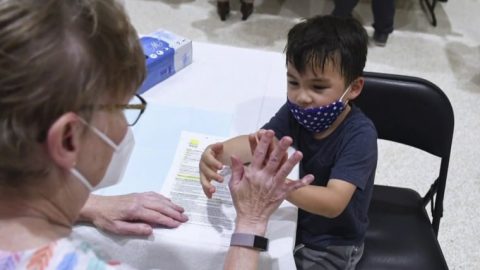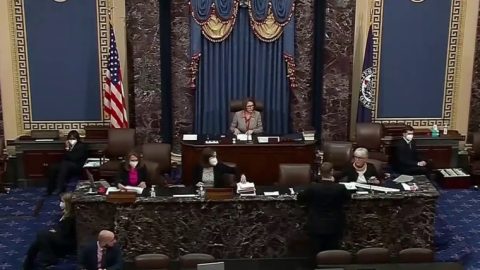The Food and Drug Administration said in a court filing late Friday that it would allow pharmacists to continue making compounded versions of tirzepatide — the active ingredient in Eli Lilly’s diabetes and weight loss drugs Mounjaro and Zepbound — while it reconsiders its decision to remove the drug from its nationwide shortage list.
The surprise move is a major victory for compounding pharmacists and patients who were furious with the FDA after its announcement on Oct. 2 that the tirzepatide shortage was resolved.
Shortages of the drug, along with semaglutide — the active ingredient in Ozempic and Wegovy — have fueled unprecedented demand for compounding pharmacies to make their own versions of the medicines, which patients say are often cheaper and easier to come by than the brand-name versions.
During FDA-declared shortages, it’s legal for compounding pharmacies to make versions that are “essentially a copy” of the brand-name drugs in shortage, though drugmakers have vehemently pushed back against the legitimacy of this practice.
The FDA’s announcement on Oct. 2 declaring the shortage over meant that compounding pharmacists had to stop filling tirzepatide prescriptions. It said at the time that pharmacies that produce large batches of medications would no longer be able to accept new orders of tirzepatide and had 60 days to fill their existing orders.
On Oct. 7, the Outsourcing Facilities Association, a compounding trade group, sued the FDA, claiming that the drug is still in short supply and should therefore remain on the shortage list.
The FDA’s filing Friday was in response to the group’s suit, saying its move was “effectively the relief that Plaintiffs sought in their motion.” In the filing, the agency said that, for the time being, it wouldn’t “take action” against the plaintiffs and their members making compounded versions of the drugs as it re-evaluates its decision.

Simone Williams, 50, of Spartanburg, South Carolina, said she had been deeply upset with the FDA’s decision to take tirzepatide off the shortage list.
Williams began taking compounded tirzepatide for weight loss last year after her Mounjaro savings card expired. She couldn’t afford the $1,060 a month out of pocket for the brand-name drug.
Williams would need to “play switcheroo” and get a prescription for compounded semaglutide, which remains in shortage, instead.
The FDA’s update is “good news,” Williams said, but she’s still cautious.
“Until the FDA makes a solid decision, I’m still going to be nervous and up in arms about it because they could come back and say, ‘no, there’s not a shortage’ and I’m back at square one,” she said.
Is tirzepatide really in shortage?
Tirzepatide was on the FDA’s drug shortage list for nearly two years. Initially approved under the name Mounjaro to treat Type 2 diabetes, many patients were prescribed tirzepatide off-label for weight loss. When it was officially approved for weight loss last year — under the name Zepbound — it soared in popularity, exacerbating the shortages.
Lilly has taken steps to ramp up production of tirzepatide, including committing billions to a new manufacturing facility dedicated to producing more of the drug.
Michael Ganio, senior director of pharmacy practice and quality at the American Society of Health-System Pharmacists, a group that tracks drug shortages in the U.S., said the group is still hearing reports from patients and caregivers suggesting tirzepatide continues to be hard to come by.
The ASHP still lists tirzepatide as in shortage, although Ganio said that could change as pharmacists learn that there is supply in stock.
“This can be the kind of thing that just takes a couple of weeks for supply to even out,” he said. “Distribution centers get replenished and then they send it out to pharmacies. The pharmacies probably all have back orders and they have customers that maybe have been getting it from the compounding pharmacy and are now trying to get it from a retail pharmacy and community pharmacy.”
Dr. Christopher McGowan, a gastroenterologist who runs a weight loss clinic in Cary, North Carolina, said he believes the lawsuit is less about whether the drug is genuinely in shortage and more about the lucrative nature of compounded GLP-1 medications.
“It’s about money,” McGowan said. “The compounding industry will argue that the supply chain isn’t stable enough, yet, but really there are many millions at stake. That’s the issue.”
Lilly says that tirzepatide is not in shortage.
In a statement Monday, Jared Shapiro, a Lilly spokesperson, said all doses of Mounjaro and Zepbound are available, warning that it’s important that patients “not be exposed to the risks in taking untested, unapproved knockoffs.”
“Nothing changes the fact that, as FDA has recognized, Mounjaro and Zepbound are available and the shortage remains ‘resolved,’” Shapiro said.
The FDA didn’t respond to a request for additional comment on its reversal.
An FDA spokesperson said in a statement prior to the Friday evening filing that the agency understands the patients’ frustration about its decision to declare an end to the shortage, saying, “we understand that high drug prices have a direct impact on patients.”
“Too many Americans are priced out of the medicines they need,” the spokesperson said. “However, the FDA has no legal authority to investigate or control the prices set by manufacturers, distributors and retailers.”
The FDA’s compounding program aims to preserve access to “lawfully marketed compounded drugs” for patients who need them, the spokesperson said, although the agency generally recommends patients use FDA-approved drugs when available.
‘Peace of mind’
Meanwhile, patients and compounding pharmacists are celebrating the FDA decision to allow tirzepatide compounding to continue.
A spokesperson for the Outsourcing Facilities Association, which filed the lawsuit, said in a statement that it was “relieved, for our members and the many patients that they serve.”
“We believe that this is a fair resolution in light of the agency’s rash decision to take the drug off the list at a time when the agency has acknowledged ‘supply disruptions,’” the spokesperson said. “Most important, should the FDA repeat its removal decision when a shortage still genuinely exists, we will return to court.”
In a statement, the Alliance for Pharmacy Compounding, another industry group, called it an “an extraordinary win” for the Outsourcing Facilities Association.
APC held a call with reporters earlier this month, saying that the FDA’s initial decision had caught compounding pharmacies “off guard” and left patients “flat-footed.”
Lilly had first indicated in August that the tirzepatide shortage would be resolved soon, two months before the official FDA decision.
The APC said in an email to clients over the weekend that it’s working with lawyers to get clarity on whether the FDA’s new filing means that it will not take enforcement against all compounding pharmacies who make tirzepatide or just the plaintiffs in the lawsuit.
“Our aim is to get in writing that FDA will take enforcement discretion related to all pharmacies compounding copies of tirzepatide injection at this time,” the APC wrote in the email.
For Elizabeth Kenly, 59, of Graham, North Carolina, the FDA’s decision gives her “peace of mind.”
Kenly was prescribed a compounded version of tirzepatide in March after she had trouble finding Wegovy because it was in shortage.
Last week, Kenly’s compounding pharmacists informed her that, because tirzepatide was no longer on the shortage list, they would need to stop making the compounded versions or seek out a different supplier. The pharmacists said that they would dispense the remaining stock and hoped to continue providing patients with prescriptions through the end of the year.
Because of the FDA’s filing Friday, Kenly doesn’t need to “scramble to figure out a plan B.”
Since she started the compounded drug, she says she has lost 30 pounds and wants to lose another 25.
“The compounding pharmacy is my lifeline to continue a therapy that has been so successful for me,” Kenly said. “I understand that research and development companies need to make money, but they also need to work together with insurance companies to ensure fair and equitable access to these medications.”









Recent Comments